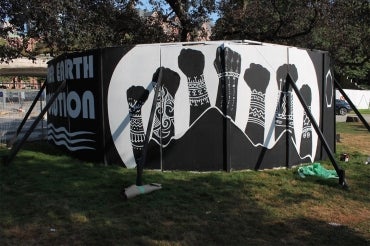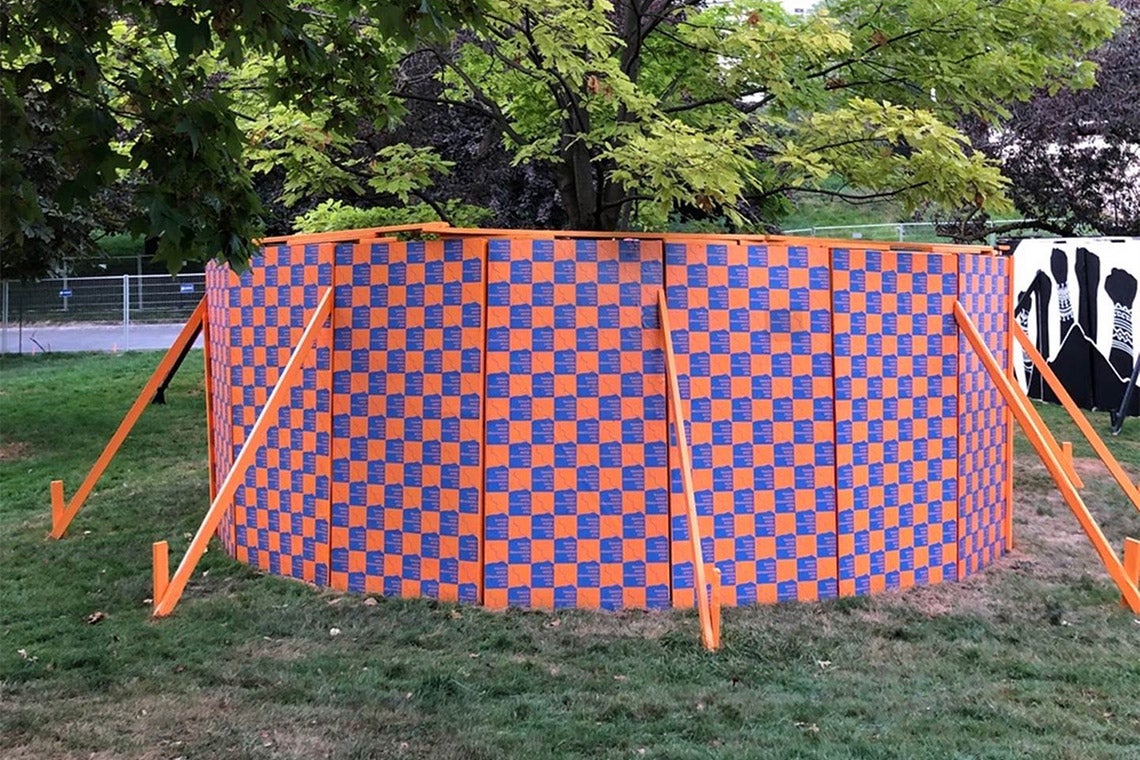Indigenous artists transform tree protection hoardings outside Hart House into eye-catching murals

Published: October 14, 2021
With construction on the Landmark Project underway on the University of Toronto's St. George campus, tree-protection hoardings in the Hart House Commons have inspired an Indigenous public art installation that draws attention to the land and community.
From September 2021 to Spring/Summer 2022, the project, titled Tree Protection Zone, features specially commissioned, mural-sized artworks by eight Indigenous artists and their collaborators. These works focus on the preservation of life, water and kin and how each is linked to the protection of trees. They aim to engage students and the wider public in conversations about the environment and its peoples.
The project – part of Hart House's efforts to build a sense of community, amplify under-served voices and foster sustainability, while celebrating artists – was curated by Mikinaak Migwans, an assistant professor of Indigenous contemporary art in Canada in the Faculty of Arts & Science, and Maria Hupfield, an assistant professor of Indigenous digital arts and performance at U of T Mississauga.
“By drawing attention to the tree protection zones found on constructions sites, this Indigenous-led public art project signals U of T’s support of work by artists who prioritize critical accountability to place, land and peoples, as part of the vibrant energy of the city,” says Hupfield.

Clockwise from top left: Christi Belcourt and Isaac Murdoch of Onaman Collective; Susan Blight; Shuvinai Ashoona; Que Rock; Carrie Hill; and Taqralik Partridge and Nils Ailo Utsi (as represented by their artwork).
The project spotlights eight artists: Susan Blight, Carrie Hill, Que Rock, Taqralik Partridge and Nils Ailo Utsi, Christi Belcourt and Isaac Murdoch (of Onaman Collective) and Shuvinai Ashoona.
Each artist used the hoardings as a support structure for their work in diverse media. They employed traditional street art techniques and a variety of other applications to turn Hart House Commons into a celebration of the garden and trees, the underground waterway of Taddle Creek and surrounding community.
“This major art in public space project, organized by the Art Museum, introduces to the campus of the University of Toronto an as of yet rarely acknowledged, but urgent sense of long-lived place: amongst the ancient trees and cared for landscapes, and amidst the short span of settler history as configured by the surrounding historic buildings, the curators and artists’ works remind us of the intertwining of human and the planet’s life, drawing out buried stories and standing both with and as protectors of the land,” says Barbara Fischer, executive director and chief curator of the Art Museum at U of T and an associate professor, teaching stream, at the John H. Daniels Faculty of Architecture, Landscape and Design.
The artists who participated in the installation were supported by student assistants and emerging artists, who benefitted from the opportunity to closely engage with the artists’ processes, vision and knowledge.

“6 Kilometres and 8000 Years long” by Susan Blight
Working with the project's curatorial team, the assistants applied a variety of creative processes as they helped to bring the artists’ designs to life. The initiative, whic brought to the foreground Indigenous perspectives and knowledge, fostered collaborations between artists, family, students and community members of diverse backgrounds.
“The role of public visual art is such a powerful one,” says Hart House Warden John Monahan, who approached U of T partners about redesigning the tree hoardings in a way that calls attention to the future Indigenous Landscape Project. A part of the Landmark project on the St. George campus, the Indigenous landscape initiative would create a highly visible Indigenous space at the heart of Hart House Green, including teaching and gathering spaces as well as gardens. Construction is due to begin in the spring or summer of next year.
“The presence of the Tree Protection Zone installation in the city, and on the U of T downtown campus, is an important visual declaration about the past, present and future of this land and the Indigenous peoples who have been stewarding it for generations. Hart House is proud to be part of this inspiring initiative,” Mohahan says.
The project was backed by U of T's Office of the Vice-President, Operations and Real Estate Partnerships, the Art Museum at the University of Toronto, Hart House, Indigenous Student Services and U of T's Office of Indigenous Initiatives. The project also received supported by the City of Toronto’s Arts and Culture Grant, the Ontario Ministry of Colleges and Universities and U of T’s Postsecondary Education Fund for Aboriginal Learners.



